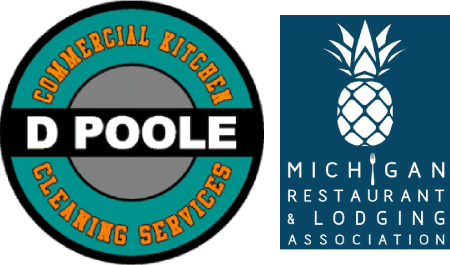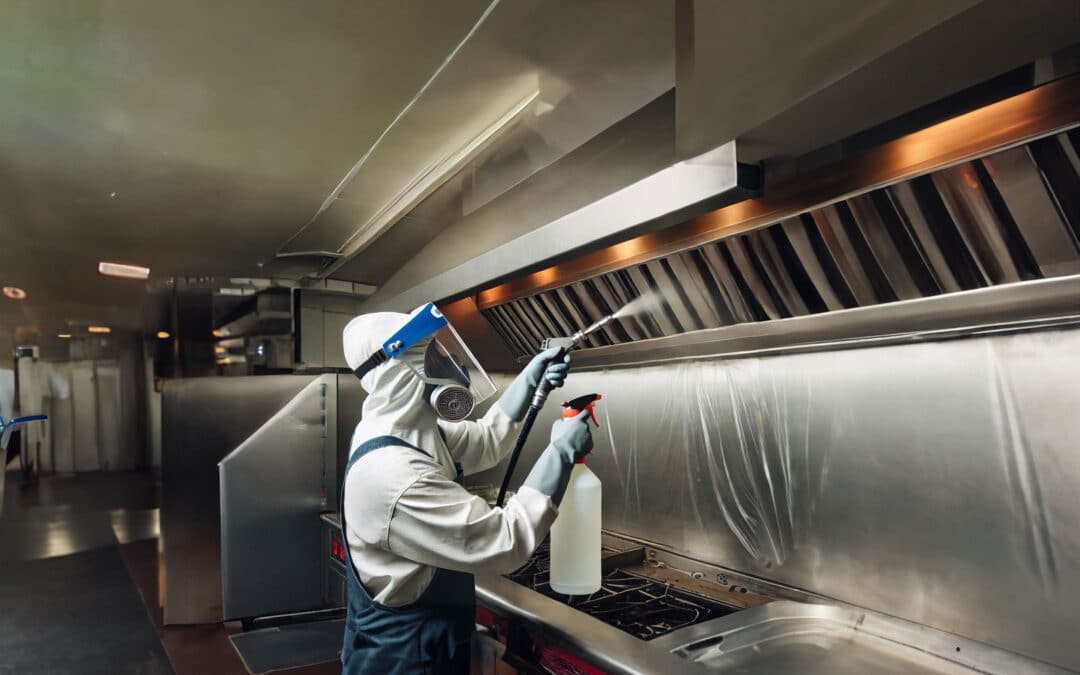Imagine this: an unannounced inspector walks through the doors of your Detroit food processing plant. One glance at a poorly cleaned drain or a piece of equipment with hidden residue could trigger a violation that stops production on the spot. Fines, public warnings, and even a forced shutdown can follow, sometimes within hours.
This scenario is not rare. In Michigan’s food industry, sanitation standards are unforgiving and enforcement is quick. The smallest lapse can lead to consequences that go far beyond a single failed inspection. If you manage a food production facility, you need to know exactly what regulators look for and how to stay one step ahead. The following guide explains why strict cleaning compliance matters, what HACCP cleaning procedures involve, and how professional commercial cleaning services in Detroit MI can help you avoid costly mistakes.
Why Cleaning Compliance Matters
Cleaning compliance is about far more than keeping equipment shiny. It protects public health, your brand, and the very survival of your business. Consider these key reasons:
- Regulatory Enforcement: Agencies like the Food and Drug Administration (FDA) and the Michigan Department of Agriculture and Rural Development (MDARD) monitor every aspect of sanitation. One missed cleaning log or a single trace of contamination can result in warning letters, heavy fines, or an immediate order to halt operations.
- Financial Protection: A temporary shutdown can cost thousands of dollars per day in lost production. Add potential legal fees, penalties, and overtime expenses to catch up once operations resume, and the price of noncompliance quickly outstrips the cost of regular professional cleaning.
- Reputation and Market Access: Retailers and distributors will not tolerate a supplier whose name appears in a recall notice. Even one publicized violation can damage long-term contracts and reduce trust among your clients and consumers.
- Product Integrity and Consumer Safety: Contamination can cause foodborne illnesses that harm customers and lead to expensive lawsuits. Protecting the people who buy your products is not just an ethical responsibility; it is the foundation of your business.
- Employee Morale and Safety: A clean, well-maintained facility creates a safer working environment. When staff members see that management invests in proper sanitation, it reinforces a culture of pride and responsibility that benefits the entire operation.
Compliance is not an occasional project; it is a continuous discipline. Skipping even one of these considerations risks far more than a citation.
Understanding HACCP Cleaning Procedures
The gold standard for food safety is the HACCP cleaning procedures framework – Hazard Analysis and Critical Control Points. This approach identifies where contamination is most likely and creates a system to control it.
- Hazard Analysis: Pinpoint potential threats such as bacterial growth, cross-contamination, or chemical residues.
- Critical Control Points: Identify the production stages, such as post-cooking cooling areas, where sanitation is crucial.
- Monitoring and Verification: Track cleaning tasks daily and verify they are carried out correctly.
- Corrective Actions: When a lapse occurs, implement immediate solutions such as re-cleaning equipment and retraining staff.
Following HACCP is not simply about passing inspections. It builds a culture of accountability where every employee knows how their role protects both the product and the consumer.
Food-Grade Cleaning for Detroit Facilities
Meeting state and federal standards requires cleaning practices designed specifically for food production. Food-grade cleaning Detroit operations demand:
- Approved Sanitizers: Only chemicals rated safe for food-contact surfaces should be used.
- Proper Rinsing and Water Temperature: Hot water and thorough rinsing kill pathogens and remove chemical residue.
- Equipment Disassembly: Many machines must be partially dismantled so hidden corners are properly sanitized.
This is not routine janitorial work. Food-grade cleaning calls for specialized knowledge and precise execution to protect both your products and your staff.
Areas That Need Extra Attention
While every plant is unique, certain zones consistently demand the closest oversight:
- Production Lines: Conveyor belts, slicers, and packaging equipment should be cleaned and sanitized at least daily.
- Cold Storage and Freezers: Moisture creates a breeding ground for mold and bacteria if deep cleaning is neglected.
- Drainage Systems: Floor drains collect food particles and must be scrubbed and disinfected regularly.
- Employee Spaces: Locker rooms and break areas can harbor pathogens if not maintained with the same rigor as production areas.
Routine inspections of these locations help you spot trouble before it escalates into a violation.
Documentation and Recordkeeping
Inspectors do not simply look for clean surfaces; they expect proof. Your facility should maintain:
- Daily Cleaning Logs signed by staff.
- Chemical Usage Records that show sanitizer concentrations and lot numbers.
- Corrective Action Reports explaining how lapses were resolved.
Thorough records demonstrate a commitment to compliance and give managers data to improve operations over time.
Training for Lasting Sanitation Compliance
Even the most detailed cleaning plan will fail without properly trained employees. Regular training should include:
- Correct handling of cleaning chemicals and personal protective equipment.
- Safe disassembly and reassembly of equipment for deep cleaning.
- Procedures for reporting contamination risks or maintenance issues.
When employees understand that sanitation is part of everyone’s job, not just the cleaning crew’s, the entire organization becomes stronger.
Why Professional Cleaning Services Are Essential
Daily cleaning is only one layer of protection. Many facilities rely on professional partners for periodic deep cleaning and compliance audits. Working with experienced commercial cleaning services in Detroit MI offers advantages you cannot match with in-house staff:
- Specialized Tools and Technology: From high-pressure steamers to HEPA-filter vacuums, professionals bring equipment designed for food processing environments.
- Regulatory Expertise: Cleaning specialists stay current on FDA and MDARD requirements and can help your facility remain audit-ready.
- Reduced Downtime: Professional crews work efficiently and often during off-hours, minimizing disruptions to production schedules.
Partnering with experts frees your team to focus on production while knowing your facility meets every sanitation standard.
Creating a Culture of Compliance
Sustainable compliance depends on leadership. Managers should:
- Communicate the importance of sanitation across every department.
- Provide the resources to support rigorous cleaning.
- Encourage immediate reporting of potential hazards or equipment failures.
When compliance becomes part of the company culture, inspections become routine rather than stressful.
Keep Your Detroit Facility Inspection-Ready
Passing a surprise inspection should never come down to luck. The smartest move is to build a cleaning plan that satisfies every regulation long before an inspector walks in. That means consistent sanitation, detailed records, and a partner who understands the stakes.
That is exactly where D Poole Commercial Kitchen Cleaning Services can step in. We work with food processors across Detroit to create tailored sanitation programs, follow strict HACCP cleaning procedures, and meet all food-grade cleaning Detroit standards without disrupting production schedules.
Call D Poole Commercial Kitchen Cleaning Services today to schedule a consultation and see how our commercial cleaning services in Detroit MI can keep your facility compliant and ready for every inspection.
FAQs: Cleaning Compliance for Detroit-Based Food Processing Facilities
Why is cleaning compliance so critical for food processors in Detroit?
Cleaning compliance is the foundation of food safety. When a facility falls short, the risk of foodborne illness increases and regulators from the FDA or Michigan Department of Agriculture and Rural Development can step in immediately. Their penalties can include hefty fines, mandatory recalls, or even temporary shutdowns. Beyond the legal consequences, a single publicized incident can damage long-term relationships with retailers and wholesalers. Consistent, verifiable cleaning practices protect both consumers and your company’s reputation.
What are HACCP cleaning procedures and why do inspectors expect them?
HACCP cleaning procedures, short for Hazard Analysis and Critical Control Points, provide a structured way to identify and control contamination risks. They require you to pinpoint where hazards are most likely to occur in your process, such as on raw-product conveyors or in cooling areas, and to document how those areas are cleaned and monitored. Inspectors look for HACCP plans because they show that a facility is not just reacting to problems but actively preventing them.
How does food-grade cleaning differ from standard janitorial work?
Food-grade cleaning Detroit facilities demand a higher level of precision than ordinary office or retail cleaning. Only sanitizers approved for food contact can be used, and staff must carefully measure concentrations and rinse surfaces to remove any residue. Equipment often has to be disassembled so that hidden areas are scrubbed and sanitized. These extra steps are essential for keeping food-contact surfaces safe and for meeting regulatory requirements.
What kind of records do regulators want to see during inspections?
Inspectors expect clear proof that cleaning tasks are completed on schedule and according to plan. They typically review daily sanitation logs, chemical usage records that show the concentration and lot numbers of each sanitizer, and corrective action reports that explain how any lapses were addressed. Accurate, up-to-date records are as important as the cleaning itself because they demonstrate that your facility can consistently maintain safe conditions.
How often should a food processing plant schedule professional cleaning?
Daily cleaning by in-house staff is essential, but most facilities benefit from regular deep cleaning by professionals, often on a weekly or monthly schedule depending on production volume and the type of food being processed. Partnering with experienced commercial cleaning services in Detroit MI helps ensure that even hard-to-reach areas receive thorough attention and that the plant stays audit-ready between inspections.
What are the most common sanitation violations inspectors find?
Typical violations include incomplete cleaning of drains or refrigeration units, failure to use the correct concentration of sanitizing chemicals, and missing or outdated cleaning logs. Each of these can result in penalties or a temporary halt in operations. Regular internal audits and professional deep cleaning services reduce the risk of these issues before an official inspection occurs.
How can management build a lasting culture of compliance?
Strong leadership is key. Management should provide regular training on cleaning protocols and chemical handling, communicate the importance of sanitation across every department, and reward employees for reporting issues promptly. When workers at every level understand that food safety is part of their job, not just the cleaning crew’s responsibility, compliance becomes a natural part of daily operations.
Can hiring a professional cleaning service help reduce downtime?
Yes. Experienced crews plan their work around your production schedule and use specialized equipment such as steam cleaners and HEPA-filter vacuums to clean quickly and effectively. This approach minimizes disruption, allowing production to resume on time while maintaining high sanitation standards.
Why is it worth bringing in an outside cleaning company when you already have in-house staff?
Professional cleaners bring advanced equipment and deep knowledge of regulatory standards that most in-house teams do not possess. They know how to implement HACCP cleaning procedures correctly, keep meticulous records, and pass unannounced inspections. Their expertise complements your staff’s daily efforts and gives you confidence that every audit will be a smooth one.
How does D Poole Commercial Kitchen Cleaning Services help Detroit facilities stay compliant?
D Poole designs custom cleaning programs tailored to the unique needs of each food processing plant. Our team follows strict HACCP guidelines, uses food-grade sanitizers, and provides thorough documentation so inspectors can see proof of compliance at a glance. By partnering with our experts, Detroit facilities can maintain spotless operations year-round and avoid costly violations while focusing on efficient food production.

